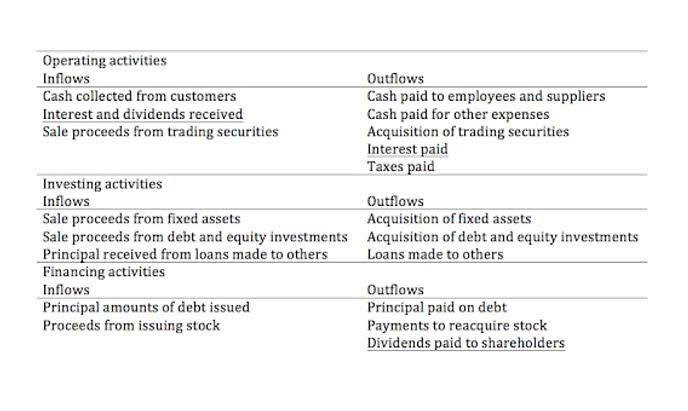When shareholders buy or sell their shares, the operations of corporations are not affected by these transfers. On the contrary, for partnerships, if a new partner joins, or an existing partner leaves, one advantage of a corporation is the existing partnership deed becomes invalid. An advantage of corporations for their shareholders is that corporations allow their shareholders to transfer their ownership without restrictions.
Your request is being processed.
This includes corporate minutes, details on annual shareholder meetings, and information on its board of directors. A corporation is a legal entity created by individuals, stockholders, or shareholders, with the purpose of operating for profit. Corporations are allowed to enter into contracts, sue and be sued, own assets, remit federal and state taxes, and borrow money from financial institutions.
Start A Limited Liability Company Online Today with ZenBusiness
- A corporation pays its shareholders dividends from its after-tax income.
- But other than that, you don’t really need anything else to get started.
- When shareholders buy or sell their shares, the operations of corporations are not affected by these transfers.
- This shareholder now has taxable income on funds that have already been assessed a tax liability.
- He is a CFA charterholder as well as holding FINRA Series 7, 55 & 63 licenses.
If any existing partner does not approve of a new partner, then the new partner cannot join the partnership. Wander American Express is an excellent option for customers with an average to excellent credit history who want to earn rewards on both everyday purchases and travel. With over a decade of editorial experience, Rob Watts breaks down complex topics for small businesses that want to grow and succeed. His work has been featured in outlets such as Keypoint Intelligence, FitSmallBusiness and PCMag. At 18 he ran away and saw the world with a backpack and a credit card, discovering that the true value of any point or mile is the experience it facilitates. He remains most at home on a tractor, but has learned that opportunity is where he finds it and discomfort is more interesting than complacency.
- Some states won’t require a copy of these, but they may be required by other entities (i.e. financial institutions may require bylaws when setting up a bank account).
- An S-corp is limited to 100 individuals shareholders and one class of stock and all shareholders must be U.S. residents.
- A corporation may be formed by an individual or group with a shared goal and can be a for-profit or not-for-profit entity.
- LLC owners (known as “members”) aren’t personally liable for business obligations.
- These executives supervise the day-to-day operations and execute the high-level strategies set forth by the board.
- In either case, company profits pass through to the members, and the members pay income and self-employment taxes on their share.
What are the Advantages and Disadvantages of a C Corporation?
It’s a good idea to consult with a professional, such as a small business counselor, tax advisor, attorney, and accountant. You can also use this BizFilings Incorporation Wizard Tool to see which business type is right for you. We collaborate with business-to-business vendors, connecting them with potential buyers. In some cases, we earn commissions when sales are made through our referrals.

Tax planning & preparation
A partnership is the default business structure for a company with multiple owners. In a partnership, co-owners report their share of the business’s income and losses on their personal tax returns. A corporation, which is formed by filing articles of incorporation, is a legally separate business entity owned by shareholders.

Cons of a Limited Liability Partnership
A corporation is a legal entity that is separate and distinct from its owners. Under the law, corporations possess many of the same rights and responsibilities as individuals. They can enter into contracts, loan and borrow money, sue and be sued, hire employees, own assets, and pay taxes. A closed corporation — also known as a private company, family corporation or incorporated partnership — is a privately held company owned by a few shareholders.

It also means that the corporation can own assets, sue or be sued, and borrow money. A distinguishing characteristic of a corporation is limited liability. Its shareholders profit through dividends and stock appreciation, but they are not personally liable for the company’s debts. Almost all large businesses are corporations, including Microsoft Corporation and the Coca-Cola Company. One advantage of a C corp over an S corp or LLC is that it has an easier time attracting investors, including obtaining capital through equity financing.
The process of incorporating and then maintaining the corporation can take thousands of dollars per year plus attorney’s fees. Unless a shareholder has done something fraudulent or is unreasonably commingled with the interests of a corporation, he or she is not individually liable for the debts and liabilities of the corporation. If a corporation goes bankrupt or liquidates, shareholder’s personal assets are generally safe. The only thing shareholders have to lose is the value of the shares they hold and any other equity they have in the corporation.

Tax Flexibility
These stages may require a lot of legal formalities to be performed. Furthermore, promoting it can be difficult and time-consuming after forming a corporation. Overall, corporations are more difficult to establish and result in more costs for the initial owners. For corporations, it means that they do not have to be affected by shareholders leaving or buying shares. Similarly, it means that the corporations can hire professionals for every management role to ensure the operations of the corporation run as smoothly as possible.
